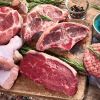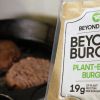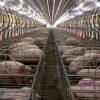-
 +23 +1
+23 +1Plant-heavy ‘flexitarian’ diets could help limit global heating, study finds
Global adoption of diet low in meat would aid health, land and food systems as well as reducing emissions, researchers say
-
 +41 +1
+41 +1In the face of climate change and food insecurity, New Zealand considers lab-grown fruit
Scientists will attempt to create fruit without the parts that are normally discarded like the core of an apple or orange pith
-
 +36 +1
+36 +1If interest in meatless burgers is waning, how can plant-based eating be sustained? | CBC Radio
Despite signs the meatless burger industry is losing steam, writers, chefs and industry experts say there is hope consumers will continue exploring more plant-based options. Writer and cook Alicia Kennedy says meatless burgers were only ever a distraction.
-
 +30 +1
+30 +1Sales at vegan burger maker Beyond Meat fall by almost a third
US firm cuts revenue forecast as consumers opt for cheaper animal protein amid cost of living crisis
-
 +2 +1
+2 +1The Backlash to Plant-Based Meat Has a Sneaky, if Not Surprising, Explanation
During the pandemic, plant-based meat consumption and media coverage exploded. Now, a host of trend pieces decry its demise. That shift is no organic accident.
-
 +34 +1
+34 +1Cultivated meat: Lab-grown meat without killing animals
For thousands of years, humans have slaughtered animals for meat. But Dr. Uma Valeti dreamt of a different way: eating chicken without having to kill a chicken. He figured out how to "grow" meat directly from animal cells. It's completely different from the meat alternatives Beyond Meat or Impossible, which are made from plant-based ingredients, including vegetable proteins. "This is real meat, no compromise, made in front of you," Valeti said.
-
 +4 +1
+4 +1Opinion: Lab-grown meat is an expensive distraction from reality
Lab-grown meat has been hailed as the future, a more ethical and environmentally friendly option than factory farm meat. Unfortunately, the hype is mostly an illusion, writes Alice Driver.
-
 +13 +1
+13 +1The Illusion of Lab-Grown Meat: Ethical and Environmental Concerns
Lab-grown meat, hailed as a more ethical and eco-friendly alternative to factory-farmed meat, has gained recent approval for sale in the US.
-
 +27 +1
+27 +1Lab-grown meat is cleared for sale in the United States
Cultivated meat, also known as lab-grown meat, has been cleared for sale in the United States.
-
 +18 +1
+18 +1The big bet on meat alternatives fails
Shares of meat alternatives soared when Beyond Meat, the California-based producer that's come to epitomize the sector, went public four years ago. But a fall in stock prices suggests that venture capital's appetite for such investments may have gotten ahead of market realities.
-
 +3 +1
+3 +1The Startup Bringing Home The $400B Bacon…Minus The Pig
With $30 million series A funding - Uncommon plans to take pork to sustainable and healthy new heights with a creative, quick and safe RNA-based way to cultivate meat.
-
 +4 +1
+4 +1The Startup Bringing Home The $400B Bacon…Minus The Pig
With 30 million dollars worth of series A funding, cultivated meat startup Uncommon plans to take pork to sustainable and healthy new heights. The stakes couldn’t be higher. Our insatiable appetite for meat is putting tremendous strain on the environment. Water resources are rapidly drained. Rainforests are ravaged for grain. Rivers run thick with effluent. Antibiotics used on farm animals put our health at grave risk.
-
 +23 +1
+23 +1Eat more beans. Please.
What kind of protein we eat has huge implications for our health — and well beyond. Besides the health, ethical, or religious reasons why people choose to stop eating meat, the way animals are raised to be food has enormous impacts on land use, deforestation, and carbon emissions. And as the global population continues to grow, per-capita meat production to meet that demand is growing even faster.
-
 +18 +1
+18 +1Beyond Burgers are popping up at Dollar Tree at $1.25 a pack, as the plant-based meat giant tries to boost sales
Beyond Meat appears to be available in a new retailer: Dollar Tree. Shoppers have posted videos to social media in the last few days showing themselves buying the plant-based meat maker's products at a steep discount to their prices at other stores. One Instagram user posted a video showing several trays, each containing two Beyond Burger patties, in the frozen food section of a Dollar Tree store.
-
 +23 +1
+23 +1Inside big beef’s climate messaging machine: confuse, defend and downplay
A Masters of Beef Advocacy program teaches ‘scientific sounding’ arguments on cattle’s sustainability in an all-out public relations war
-
 +16 +1
+16 +1Vegan Chocolate Market To Grow Faster Than Dairy, Experts Predict
The dairy-free and vegan chocolate market is expected to see enormous growth in the next nine years, outpacing conventional dairy alternatives. New data suggests that the plant-based chocolate sector, currently valued at $1 billion, will reach $4 billion by 2032. This equates to a 15.5 percent annual growth rate. Comparatively, the overall chocolate market, valued at $262.5 billion in 2022, is likely to grow at just 3.7 percent, annually.
-
 +4 +1
+4 +1Texturized chickpea protein for meat alternatives a ‘first-of-its kind’ breakthrough
Meat.The End claims to be introducing the first meat alternative burger to market made from texturized chickpea protein isolate, using its proprietary technology. We catch up with CEO Dr Yishai Mishor to ask what makes this development an industry first.
-
 +18 +1
+18 +1Plant-based sales boast 22% growth since 2020
Sales of plant-based foods across 13 European countries have grown by 22% since 2020 with the category reaching a record €5.7 billion, according to a new report. International nonprofit the Good Food Institute Europe (GFI Europe) analysed NielsenIQ data, finding sales of plant-based meat grew to €2 billion in 2022 – accounting for 6% of the overall pre-packaged meat market – while other categories, including plant-based seafood and cheese, saw double-digit growth.
-
 +17 +1
+17 +1Lab-grown chicken meat is getting closer to restaurant menus and store shelves
A scientific quest to feed the world, protect animals, and cut down on greenhouse gas emissions is on the cusp of a major milestone in the U.S., advocates say.
-
 +17 +1
+17 +1Italy moves to ban lab-grown meat to protect food heritage
Prime Minister Giorgia Meloni says the proposed ban aims to protect farmers and consumers.
Submit a link
Start a discussion




















